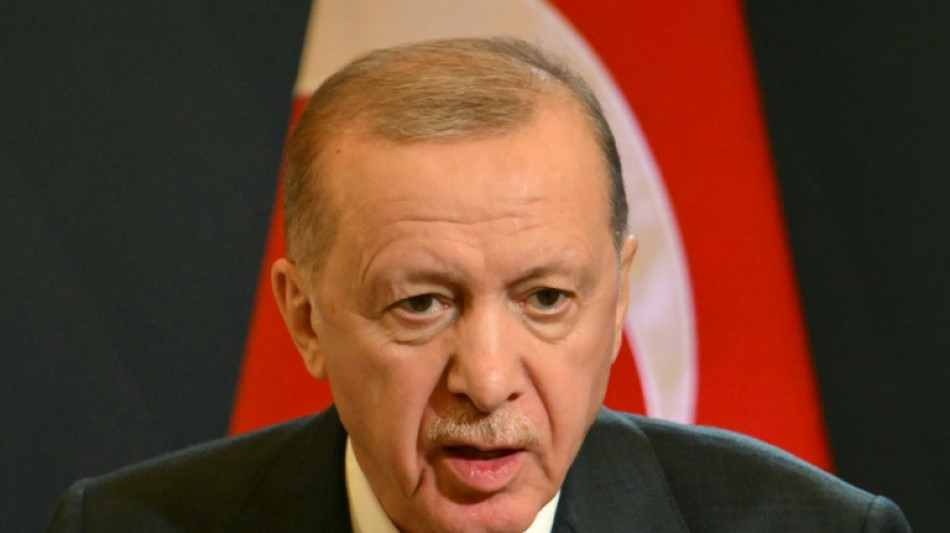
CMSC
0.0700

Alarmed by the fact that Turkish women are having fewer children, President Recep Tayyip Erdogan has moved to tackle falling birthrates -- "a threat greater than war" -- through policies designed to bring on the babies.
After declaring 2025 Turkey's "Year of the Family", Erdogan last month announced 2026 would mark the start of the "Decade of the Family".
But his pleas for women to have at least three children and offers of financial incentives for newlyweds may not be enough as Turkey grapples with a deepening economic crisis.
Official figures show Turkey's birthrate has fallen from 2.38 children per woman in 2001 to 1.48 in 2025 -- lower than in France, Britain or the United States -- in what Erdogan, a 71-year-old pious Muslim and father-of-four, has denounced as "a disaster".
During his 22 years in office -- first as premier, then president -- fertility rates have dropped sharply in this country of 85 million people.
Erdogan has blamed both women and LGBTQ "perverts".
"Women and LGBTQ+ individuals are considered the only culprits for the declining population growth rate, with no acknowledgement of political mistakes," said retired academic and feminist activist Berrin Sonmez.
"People might be hesitant to have children in this chaotic and uncertain environment. Additionally, child support is almost non-existent and education has become the most expensive sector," she said.
- No education, no jobs -
High inflation has raged in Turkey for the past four years, forcing education costs up by more than 70 percent over the past year, official data shows.
In the first quarter, unemployment stood at 8.2 percent, or 15 percent among 15- to 24-year-olds.
Researchers with the DISK union say the real rate is 28.5 percent, and 37.5 percent among young people.
But the government seems bent on fixing other issues, such as Turkey's record number of elective Caesarean births -- which stands at 61 percent, rising to 78 percent in some private hospitals.
In April, Turkey banned C-section births at private healthcare facilities "without a medical justification".
The procedure generally limits the number of pregnancies to two, or a maximum of three.
- C-sections: the 'safer option' -
Medical professionals say the high number of C-sections is linked to the rampant privatisation of the healthcare system since the late 1990s.
C-sections are more time-efficient for medical staff -- 30 minutes, versus 12 hours for a traditional delivery -- and lower the risk of legal action over complications, said Hakan Coker, an Istanbul-based gynaecologist.
"Ultimately, C-sections are perceived as a guarantee of safety" for doctors and women alike, he said.
Dr Harika Bodur, an obstetrician at a major Istanbul hospital, said some women ask for a C-section "at the first appointment for fear of pain".
"If you refuse, they'll go elsewhere," she said.
The fear is rooted in a lack of education and discomfort with sexuality, she said.
The health ministry says it is now "aiming for a target rate of 20 percent (of C-sections) by encouraging normal childbirth through education of future parents".
But the word "normal" has raised hackles -- notably last month when a football team carried a huge banner promoting vaginal births onto the pitch before a top-flight clash, which read: "Natural birth is normal."
- Women as 'birthing machines' -
"If I don't want to, I won't have any children at all, it's my right," said 23-year-old chemistry student Secil Murtazaoglu.
"Access to abortion is already difficult. Now they want to limit C-sections. It's all about the oppression of women," she said.
In 2012, the Turkish president described abortion as "murder", but stopped short of banning it.
By offering interest-free loans of 150,000 Turkish lira ($3,800) for newlyweds and a monthly allowance of 5,000 lira from the third child onwards, Erdogan was trying "to turn women into birthing machines", Murtazaoglu said.
Feminist activist Sonmez said women were subjected to huge pressures, both within their families and within society, when the much more pressing issue was the need to tackle gender violence.
"We must start by combating violence against women: such policies have been eradicated and protections seriously undermined," she said.
W.Cejka--TPP